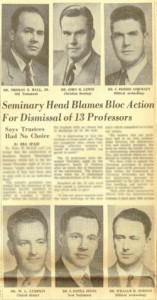Tension: 1950-1981
Duke McCall began his long tenure as president in 1951. He was deeply committed to the Southern Baptist Convention and sought to check the modernizing impulses of the more aggressive faculty members. By the time of McCall’s presidency, most of the faculty agreed broadly with a modernist or neo-orthodox approach to scripture. McCall supported a cautious adoption of the historical-critical approach to the Bible. Though restrained, the modernism of Southern’s faculty had significant influence throughout the SBC.
In 1952, Southern opened the School of Religious Education, designed to prepare ministers for education, and secretarial work. A year later, McCall organized the academic program into three schools: Religious Education, Theology, and Music. McCall also oversaw the formation of a school for wives in the late 1950s and directed attention to the construction of a campus library. In 1957, Southern alumni promised to raise five hundred thousand dollars for the construction of the James P. Boyce Memorial Library. Completed in 1959, the new library came at a cost of 1.75 million dollars and provided the campus with a modern home for its rich repository of theological resources. Librarian Leo Crismon presided over the facility and shelved the first book in the building, a copy of the Geneva Bible donated by President Boyce.
The advent of new disciplines such as pastoral care and clinical training for chaplain candidates contributed to a rift in the school of Theology. Part of the faculty wanted the Department of Psychology of Religion to expand, while others resisted this trend, urging for the centrality of the classical theological track and pressing for more aggressive adoption of liberal scholarship.
This conflict reached its peak in 1958, when a bloc of thirteen professors opposed President McCall and his vision for the school. The seminary trustees remained supportive of McCall and in April 1958 registered their confidence in him by a 42 to 7 vote. The thirteen were unwilling to submit to McCall’s leadership and were dismissed shortly thereafter. One, J. J. Owens, gained reinstatement.
Southern further expanded its programs and its campus in the 1960s and early 1970s. In 1966, due to a generous donation to Southern from the Billy Graham Evangelistic Association, the seminary created a chair in evangelism named after the preacher. In 1970, the seminary instituted the Doctor of Ministry program and opened the Cooke Building of Church Music. During this period, students numbered 1,575, the highest figure recorded at Southern to that point.
The seminary community faced a collective challenge on April 3, 1974, when a tornado struck the campus and nearby neighborhoods. The campus had no heat or light for ten days and the seminary had to suspend classes for eighteen days. Estimated damage to Southern was around one million dollars.
The seminary changed its doctoral program in 1974, replacing the Doctor of Theology degree with the Doctor of Philosophy degree. Boyce Bible College also opened in this year and offered adults who had not completed a collegiate degree the opportunity to prepare for ministry. In 1975, Roy Honeycutt, formerly dean of Midwestern Baptist Theological Seminary, became the dean of the School of Theology. Honeycutt presided over a talented faculty that counted scholars Findley Edge, Glenn Hinson and Frank Stagg among its key members.
In 1981, McCall retired. He had long mediated the uneasy discourse between Southern Baptists’ commitment to traditional orthodoxy and the faculty’s commitment to modern theology. For almost thirty years, He led Southern in a moderate direction that he thought honored both parties. McCall’s guidance drew praise from some, ire from others, and fed the building denominational tension between moderates and conservatives. This tension soon exploded in a decade of turmoil and change in the SBC.
*Newspaper article (c) Courier-Journal



